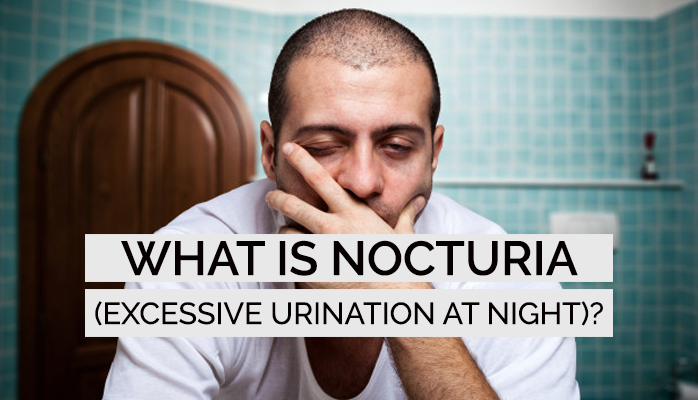There is a Condition for Frequent Nighttime Urination: Nocturia
Are you waking up several times or more throughout the night to go pee? Is it causing you to feel tired in the morning and sleep deprived throughout the day? This phenomenon is known as nocturia, or nighttime urination.
Nocturia is a nuisance that leads to sleep deprivation and should be taken seriously. Because of this, it's important to recognize the signs that one may be experiencing sleep deprivation versus the occasional instance of needing to urinate at night.
Someone without nocturia will usually go the whole night without having to wake and urinate. At most, if too much alcohol or water was consumed before bed, such people will wake up once and go back to sleep after relieving themselves. With nocturia, an individual may wake up anywhere from three times or more a night.
This has the potential of causing wakefulness nearly every hour. A few consequences of the resulting sleep deprivation are:
- Daytime sleepiness if waking three times a night
- Significant sleep deprivation if waking five times a night
- Severe sleep deprivation if waking more than five times a night
Symptoms of Nocturia
Nocturia symptoms are straight forward, most nights require at least three wake times during the night in order to urinate.
If one urinates at night and is concerned about potentially having nocturia, some questions they may ask themselves are :
- How many times they wake up to urinate
- Whether or not they are experiencing daytime fatigue
- How much they urinate when they wake up
- Whether or not they are drinking caffeine or alcohol before bed
Assessing these points is important can assist those concerned about nocturia by:
- Helping them identify if they have nocturia, or providing valuable information to their doctor for a diagnosis
- Potentially identifying what is causing your nocturia
- Understanding how severe it is
Keeping a sleep journal will be helpful for this
Nocturia vs Bed Wetting
Nocturia is not the same as bed wetting. Bed wetting does not involve rousing from sleep. Bed wetting may be a natural occurrence, but Nocturia can be caused by a multitude of factors, or a combination of factors, such as:
- Lifestyle habits
- Medical conditions
- Naturally occurring life circumstances
- Sleeping disorders
Let’s look at these causes in more detail.
Nocturia Not a Full-Bladder Problem
Up until recently, people thought that simply have a full bladder was the cause of nocturia. However, many suffering with nocturia can tell you that the urge to pee that wakes them up does not usually transpire to large amounts of urine to dispel.
While a full bladder can cause nocturia in isolated cases, a full bladder isn’t the cause of chronic nocturia unless one is in the habit of drinking excessive water or alcohol before bed every night.
Natural and Lifestyle Causes of Nocturia
Nocturia can be a naturally occurring condition for biological and lifestyle reasons. Some common examples are:
- With age, the body produces less anti-diuretic hormone and/or the bladder loses holding capacity
- During pregnancy, due to the bladder being squeezed
- Excessive alcohol
- Excessive coffee
- Excess water before bed
- Symptom related to sleep apnea
In the case of lifestyle causes, such as drinking too much water or alcohol, nocturia can usually be treated by cutting out the habit by drinking more liquids earlier in the day and abstaining from alcohol and caffeine in the few hours before bed since they stimulate urine production.
Keep a sleep diary if you having trouble with nocturia to see if you can identify lifestyle habits that may be causing it.
Medical Causes of Nocturia
There are also medical conditions which can cause nocturia, including:
- Urological infection
- Tumor of the bladder or prostate
- Disorders affecting sphincter control
- Heart failure
- Liver failure
- Diabetes
For these reasons, someone is experiencing nocturia, then they should be evaluated quickly to evaluate for the presence of a potentially serious condition.
Treating Nocturia
As discussed, nocturia may be causes by lifestyle factors. However, there are serious medical conditions that can cause it as well. If you are experiencing nocturia, consult your doctor or sleep specialist right away.
Being able to provide the following information to a doctor or sleep specialist will be helpful for them to know:
- How many times one woke up the previous night
- How much urine one expelled each time you went
- What one drank the previous evening and when they drank it
- How they feel during the day (okay, tired, very tired, etc.)
Generally, treatment begins with medications, bladder or neurological tests, an ultrasound, or a recommendation to a sleep center for testing. Click the orange button below to take a free online sleep test and get in contact with one of our sleep health professionals.


